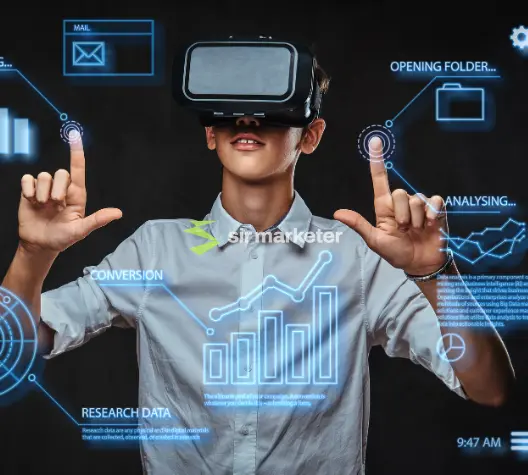

Click. Scroll. Tap. For years, the web has been a two-dimensional experience—until now.
With Augmented Reality (AR) entering mainstream web design, brands are no longer limited to static visuals or plain text. AR introduces a new era of interactive, immersive, and deeply engaging digital experiences that blend the physical and digital worlds.
Imagine users trying on products virtually, visualizing furniture in their home through your website, or interacting with 3D models in real-time—without ever downloading an app. That’s the power of AR in web design.
In this blog, we’ll explore how Augmented Reality is revolutionizing UX/UI, boosting conversion rates, and giving brands a futuristic edge online.

“Websites used to be pages. Now, they’re portals.”
— Sir Marketer, Digital Dream Team

Augmented Reality overlays digital elements—like images, 3D models, or data—onto the real world, typically through a smartphone or device camera.
When integrated into a website, AR allows users to:
And all of this happens inside the browser—no special app required. This is made possible through technologies like:
WebXR
WebAR.js
8thWall
Zappar
Three.js
AR isn’t just a feature—it’s a game-changing UX innovation.

Consumer expectations are changing. They want experiences—not just information.
Here’s why AR in web design is gaining momentum:

For businesses, AR helps bridge the gap between the physical and digital—turning clicks into real-world interaction.

A). E-Commerce: Try Before You Buy
Virtual try-on for glasses, shoes, or makeup
Place furniture at home using mobile AR
View 3D product models from all angles
Example: IKEA Place or Warby Parker’s AR try-on
B). Education & Training
Interactive anatomy lessons
AR learning modules for science or history
Real-time quizzes with visual elements
C). Real Estate & Architecture
Virtual property walkthroughs
Visualize home renovations or interior layouts
D). Event & Tourism
Augmented city tours
Interactive museum experiences
360° views of destinations
E). Brand Storytelling
Bring packaging or brochures to life via browser AR
Launch campaigns with immersive storytelling
Example: Pepsi’s “Unbelievable Bus Shelter” or Netflix’s AR Stranger Things campaigns

a) Immersive User Experience
AR captures attention and keeps users engaged longer.
b) Higher Conversions
Visual interactivity increases buyer confidence and reduces product returns.
c) Brand Differentiation
Few websites currently use AR—early adoption sets you apart.
d) Improved Mobile Engagement
AR is made for mobile-first users and enhances their experience on smartphones.
e) Data-Driven Insights
AR interactions can be tracked to measure user behavior and improve personalization.

To implement WebAR, you need:

If you’re working with a digital marketing company like Sir Marketer, we handle this entire tech stack—from design to deployment.

A). Focus on Utility
Don’t add AR just for novelty. Make sure it serves a purpose—whether it’s helping users visualize, compare, or learn.
B). Keep UX Simple
Even if the technology is advanced, the experience should be intuitive. Use familiar buttons, short tutorials, and clear calls-to-action.
C). Optimize for Mobile
Most users will access AR from their phone. Make sure models are lightweight and load quickly.
D). Use AR to Enhance, Not Replace
AR should complement core content, not replace basic info like descriptions or specifications.
E). Include Loading States
AR elements may take a moment to load. Use preloaders or messages to keep users informed.

AR impacts site speed, mobile usability, and user behavior—all of which influence SEO.

Search engines prioritize fast, accessible, and interactive content—AR fits perfectly when executed well.

Challenge | Solution |
|---|---|
Performance lag | Use compressed, optimized assets |
Cross-browser compatibility | Rely on WebXR-supported tools (like 8thWall) |
User education | Add brief onboarding tips and icons |
High development cost | Start small—use AR for one product or section |
Accessibility | Offer non-AR alternatives for users without support |
With the right strategy, AR doesn’t need to be expensive or complex. Start small, scale smart.


As more devices support WebXR natively, AR will become standard, not special.

At Sir Marketer, we create next-generation web solutions that fuse design, technology, and performance.

Whether you’re an eCommerce brand, real estate firm, or digital innovator—we’ll help you bring immersive storytelling to life.
In the competitive digital landscape of 2025, it’s not enough to describe your products or services—you need to show them, interactively, and contextually.
That’s what Augmented Reality in web design does. It transforms your site from an information hub into a virtual showroom, a hands-on demo, a brand experience your audience won’t forget.
Whether you’re aiming to increase engagement, reduce returns, or simply wow your visitors—AR is the tool to do it.
The future of web isn’t just flat. It’s immersive.
And with Sir Marketer, you’re ready for it.
Our team will answer all your questions. we ensure a quick response.